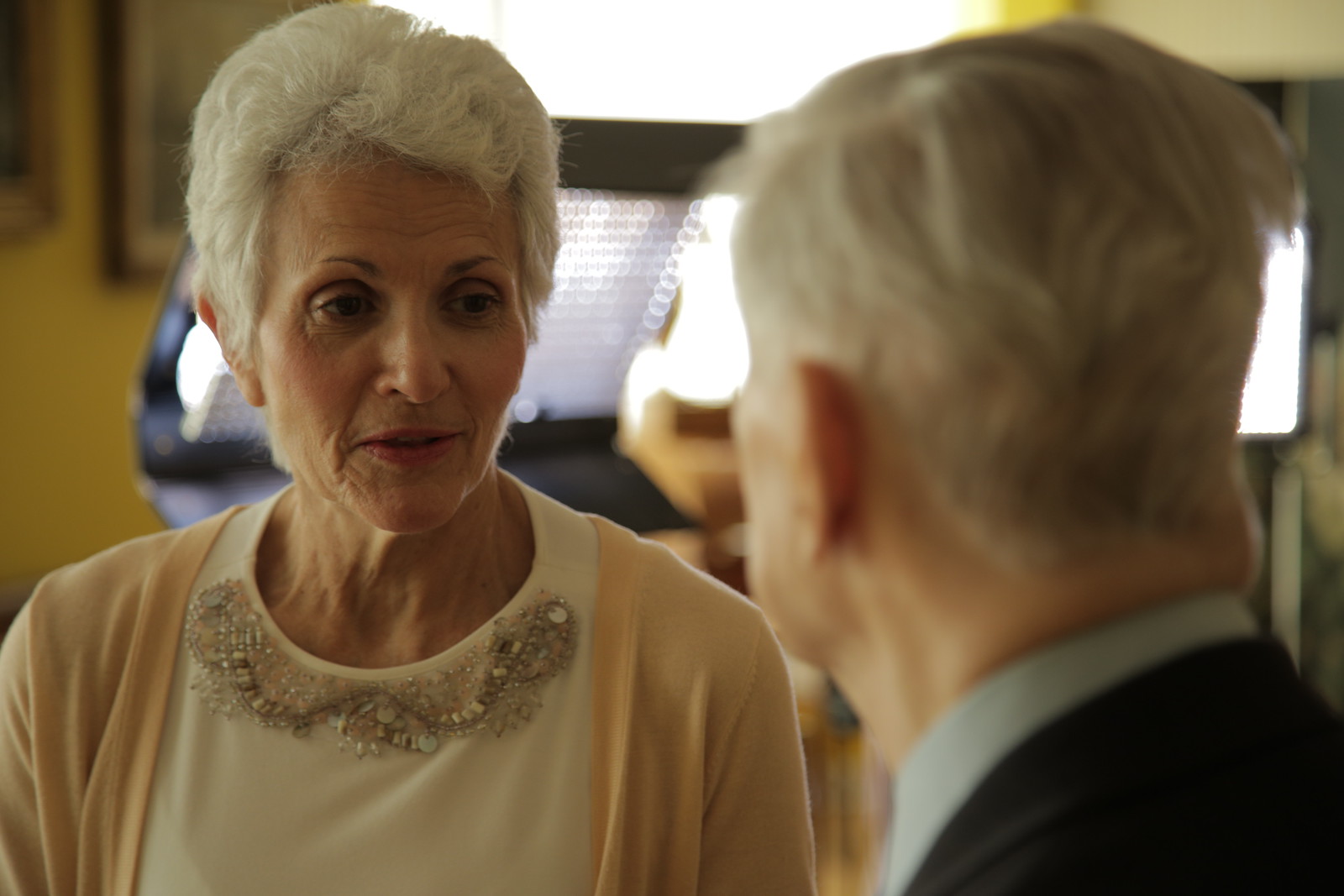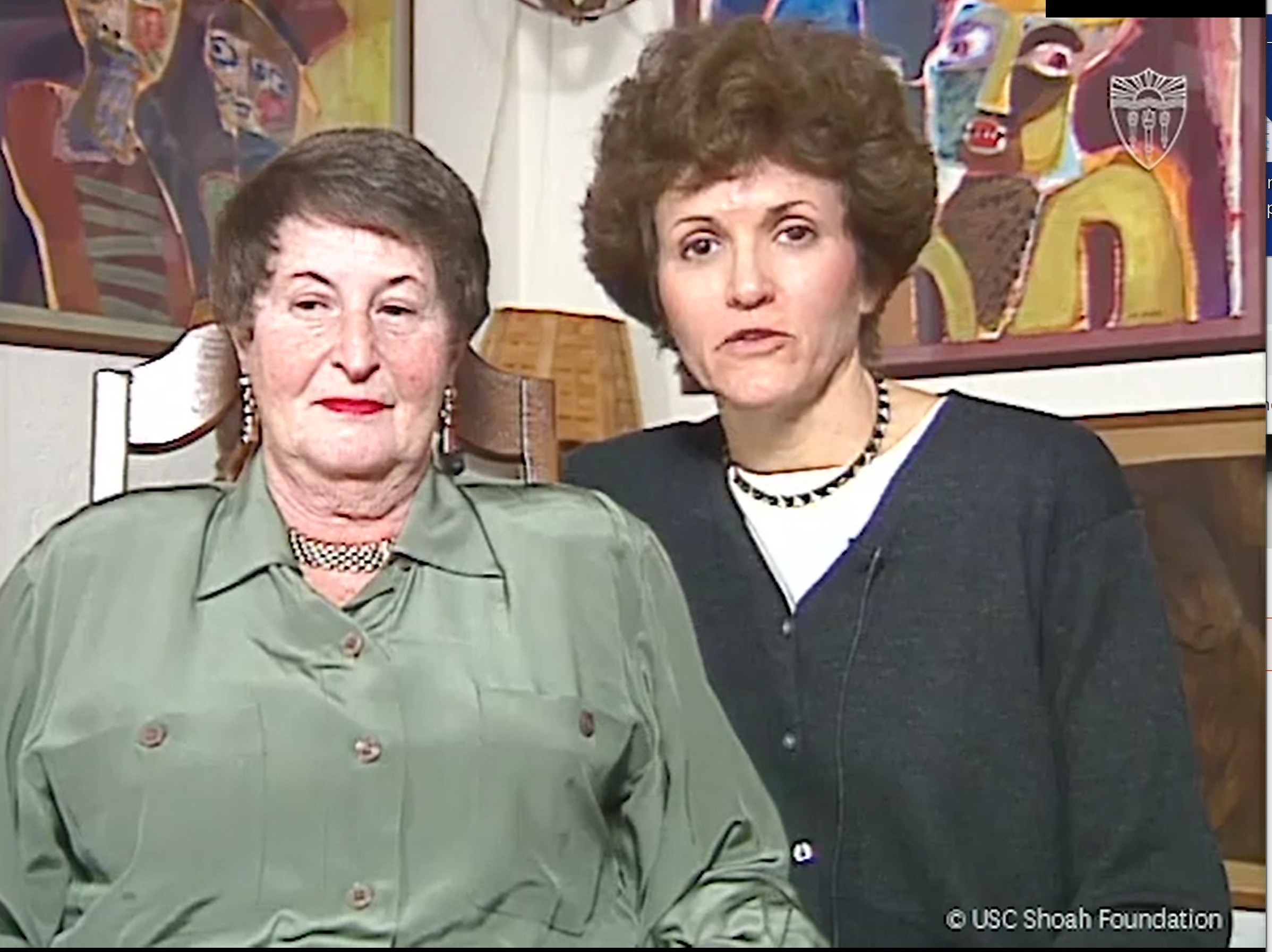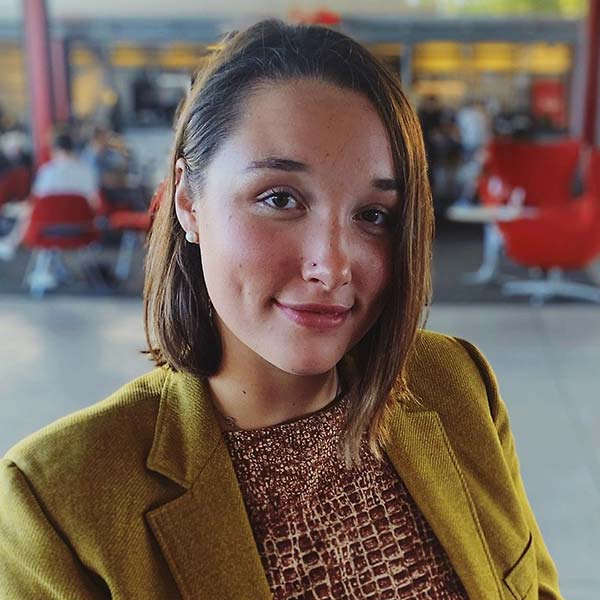Nancy Fisher Reflects on 25 years of Conducting Holocaust Survivor Interviews

On November 7th 1996, Nancy Fisher, a bundle of nerves, knocked on the door of Erika Gold’s home in Leonia, New Jersey. She was there on behalf of the Shoah Foundation to interview Erika, a Holocaust survivor. Nancy was terrified to conduct the interview. Knowing only the Nancy Fisher of today, I am shocked to hear this. Nancy exudes a calm wisdom, care, and confidence that only 25 years of Holocaust survivor interviewing could foster. Last week, I sat down with Nancy to discuss her 25th anniversary with the Shoah Foundation, the over 120 interviews she’s conducted, and her hopes and fears for the future of our collective memory.
Nancy and I join a Zoom call, and right away she’s telling me a story before I can hit record—that’s just how it is with Nancy. She’s always one step ahead, always more prepared and more thorough than you could ever dream to be. Nancy tells me that in the beginning, despite undergoing Shoah Foundation interviewer training, she refused to be an interviewer. Feeling wholly unprepared, she insisted on working for Shoah Foundation’s New York office instead, packing tapes and answering phones. They scheduled an interview for Nancy anyway—with Erika Gold, “pushing the baby bird out of the nest, so to speak,” Nancy quips. Nancy fervently prepared for the interview, bringing questions she wanted to ask Erika. “I knew that somewhere in the directions for interviewers, that carrying notes into the interview was a no-no,” she describes. Her anxiety levels running high, Nancy recalls running out of the house to implore her videographer, Kirsten Johnson (who would go on to direct Cameraperson and Dick Johnson Is Dead) to keep the notes a secret from the office manager at the time, fearing her reputation as a new interviewer might take a hit.
Nancy remembers Erika’s testimony as if it were yesterday: “Erika was a fine, clear narrator of her youth.” Nancy describes Erika’s family fleeing Merchingen, Germany for Mannheim after experiencing extreme violence on Kristallnacht; that in attempts to reach the United States her family wound up in Gurs in the French Pyrenees instead. Erika’s mother was able to tap into the “generosity and trust” of Œuvre de secours aux enfants, or OSE—a French Jewish humanitarian organization—sparing Erika from living in the internment camp of Gurs. Nancy remembers the most traumatic part of the interview, when Erika described obtaining permission to visit Gurs and see her parents. Erika “became hysterical” when “recalling what her mother looked like since the time [Erika] had left her. Her [mother’s] hair had turned white,” Nancy says. “The breakdown happened at the end of the tape. And my poor mind is racing because
something's telling me, reminding me not to get out of my chair. This was my first experience with a survivor becoming emotional and recollecting an experience, so I didn't get up. But Kirsten went and comforted her, and then we waited until she had composed herself and went on. Here it is all these years later and I can remember it quite clearly.”
Twice during the interview, a cuckoo clock went off. “You're supposed to put a sign on the door, ‘filming in progress, please do not disturb.’ If it's an apartment, you don't want the exterminator showing up; you unplug the phones. But there were no instructions about cuckoo clocks,” Nancy laughs. “So, one goes off in the first tape and we stopped the camera and stopped the pendulum. But [Erika] didn't tell me she had another one upstairs. So, a second [cuckoo clock] went off upstairs in the second tape.” The memory is a warm one, just like Nancy’s memories of Erika herself. Nancy’s recollection of her interview with Erika is vivid, possibly due to her multi-decade friendship with the survivor. Following the 1996 interview, Nancy would join Erika, Erika’s daughter, Deb Miller, and a longtime friend of Erika’s, Ann Seibold, for tea at least once a year. “That wasn't the only time that I would speak to [Erika],” Nancy clarifies. “I would call her regularly. It was always an easy phone call. [She] always asked about my children and my grandchildren. We enjoyed each other's company.” Over the years, Nancy’s friendship with Erika deepened, and now lives on through Erika’s daughter, Deb. For the first time since the pandemic began, Nancy scheduled another ladies’ tea. The event will be markedly different, as this time Erika will be absent: in April of 2020, Erika passed away at the age of 92.
“She gave me many gifts,” Nancy says of Erika. Another gift being an introduction to Serge Klarsfeld, the Romanian-born French activist and Nazi hunter, a man who dedicated his life to documentation of the Holocaust. “Erika had a copy of Klarsfeld's original Memorial To The Jews Deported From France. This is the first edition that he did, this was the beginning of his work, really. And she brought it out and she showed me her parents’ names. Her maiden name was Fleischhacker and she showed me [their] names because they were deported to Auschwitz and gassed there. The gift was that I found a bookseller because I realized that this was an important book, and I got my own copy.” Twenty five years later, Nancy is a friend of Klarsfeld, actively translating the second volume of his French Children of the Holocaust, a collection of photographs and biographies of the children who were deported from France to Auschwitz and other Nazi death camps. To make the web even more interconnected, Nancy has been working on the translations with Arlette Baker, a French born child survivor whom Nancy interviewed in 1997. “So, so many dots are connected in this experience. [Erika] was a wonderful woman and very intellectual, a great reader and very beautifully cared for until the end of her life by her daughter, Deb Miller,” Nancy declares. “We always had the nicest times getting together for tea. We were there as four women, but every single time we got together, the war was never far away. The long reach of trauma always came up, it always came up.”
I ask Nancy about this special relationship with Erika, and how she’s formed and kept relationships with the other survivors she’s interviewed over the years. With the interviewees she’s kept in touch with, Nancy says, “there was some connection beyond the war. It could have been personality, things we liked, things we laughed about.” She jokes that in a way, the friendships she’s made over the years were an act of defiance. “Michael Berenbaum, who was the head of the Shoah Foundation in the early years, I remember him telling us [interviewers] at the or 92nd Street Y to ‘let them go.’ To let the survivors go. So, I guess it was an act of civil disobedience,” she smiles. In reality, the relationships she’s made seem out of her control, a natural bond born from such a unique and special moment in time. “It's not because they were lonely, or I was lonely—I was a busy woman. But there was something that came out of the experience together.”
I wonder what first inspired Nancy to get involved with this work, if she has a personal connection to the Holocaust. I receive an emphatic no. While a New York Times article on Steven Spielberg’s Holocaust documentation project first piqued her interest, Nancy declares: “everything I've done in my life has always been citizen's interest in something.” Before she began interviewing for the Shoah Foundation, Nancy founded a child abuse and neglect treatment program in Manhattan in 1977 called SCAN New York. “I don't go looking for these things, some things fall into your lap and they have your name on it. I'm not a heroine, but somebody, somebody should be doing it. And obviously, Steven Spielberg felt the same way.”
If you’re speaking or interacting with Nancy, it’s evident that she lives a life guided by empathy. I ask her if it’s this empathy that makes her such a good interviewer and that makes for a good interviewer in general. “Empathy is different from pity. Pity doesn't go along with these interviews,” she says. “Empathy means that you can understand as much as you are able, not having gone through it. You have to understand the history and you have to, hopefully, be able to make that person feel comfortable enough to open up and perhaps talk about things that are difficult and unpleasant.” On the matter of history, Nancy is an avid student of it. To know Nancy is to have an impossibly long reading list, each interaction with her resulting in a new recommendation. During our conversation she notes that she almost exclusively reads nonfiction, not caring for novels. “I read history,” she asserts. “[Novels don’t] make me feel better, because they usually tie up threads that were never tied up.”
Nancy is able to dive into the messy truths of history when preparing for her interviews, while also acting as a pillar and guide for survivors in a situation that can become emotionally harrowing. “You have to be strong enough to be able to hear things. I guess it's not that different from being a therapist, which I'm not trained to be. But you have to be able to hear about brutal things and to listen and to keep your train of thought and focus, and not fall apart,” Nancy says. “These interviews, time and time again, gave survivors the chance to say things that they had not said before to children or to friends. There were moments in their experience which were truly horrifying—horrifying isn't even a good enough word. But they were able to get it out. These interviews are for history and for teaching and education, but they have a great ability to release some of the trauma from the survivors.”
I ask how Nancy has taken care of herself for 25 years, acting as constant soundboard for this trauma. “I think the only way you can do it, is to do it halfway,” she explains. One half of her life immersed in the Holocaust, the other half of her life being that of a wife and grandmother, a full and wonderful life outside of the reality of such a brutal genocide. She notes she’d have to cut ties and throw out every book in her house to remove herself from the subject completely. “It doesn't go away. I carry it in my heart,” she says. But besides the weight of trauma, Nancy says she also carries “the sense of gratitude that I can still [interview] and that they want me to do it […] It's been so many years. I don't know what it will be like when this stops.”
Her work is decidedly not stopping anytime soon, as Nancy continues to interview at least a survivor a month. We discuss what’s changed over the course of two-plus decades of interviewing, what she notices now that she didn’t then. “You know, the survivors I interviewed [then], they were more hopeful about the world. And now we have many reasons to be concerned and cautious—the Charlottesville trial is going on as we speak. This afternoon, Deborah Lipstadt is supposed to speak at the trial. She's testifying about antisemitism, and it's really a wakeup call.” And this is exactly what the Shoah Foundation was created to do, Nancy says: to push back against hate.
Nancy, like most Shoah Foundation interviewers, ends her interviews by asking survivors if they have a message for future generations. Nancy’s message is simple: “Stop denying history.” She discusses the frightening combination of technology and the passage of time leading to further Holocaust denial and spread of lies. “People who hate Jews and who deny the Holocaust would be hard pressed to explain the Second World War,” she says. “So, it's not just that they're racists or hate Jews—they're not educated about history.” Nancy acknowledges that racism and white supremacy won’t disappear, but believes education offers a path towards combatting hate. And her work with the Shoah Foundation, and with the Museum of Jewish Heritage where she serves as a trustee, contribute to this fight. “You know, my fantasy is to bring white
supremacists and to walk them through the [Museum of Jewish Heritage], and to see if walking through our museum would have an impact on them. Would they have the courage to see something that they've been denying or that they just don't understand?” We all are prejudiced in our own ways, Nancy concludes. “Everybody would like to be known as not being prejudiced, but that just isn't human nature. But instead of having prejudice carry you through to something that is violent, let it take you to a place where you can learn that there's a different way.”
After so many years, and so many stories of the worst of mankind, Nancy still believes “hope is indefatigable.” What’s she’s left with after 25 years with the Shoah Foundation is an admiration for each of the survivors she’s interviewed. “They survived extraordinarily challenging circumstances and—they certainly came out affected—but they came out and they went on.” Before we end our Zoom session, Nancy circles back to Erika Gold, her first interviewee, remembering her upcoming date for tea with Erika’s daughter Deb. “It's nice to know that I will be seeing Deb Miller again and we'll be talking about how we are. And we go on—that's what we have to do. We go on,” Nancy pauses. “We all lose our parents, different ways, different reasons. But we have to take the good things that have been given to us and go forward.” “I think that's a beautiful way to end,” I reply.
Like this article? Get our e-newsletter.
Be the first to learn about new articles and personal stories like the one you've just read.

